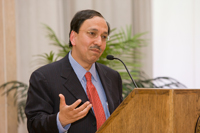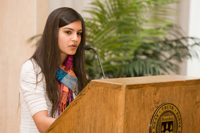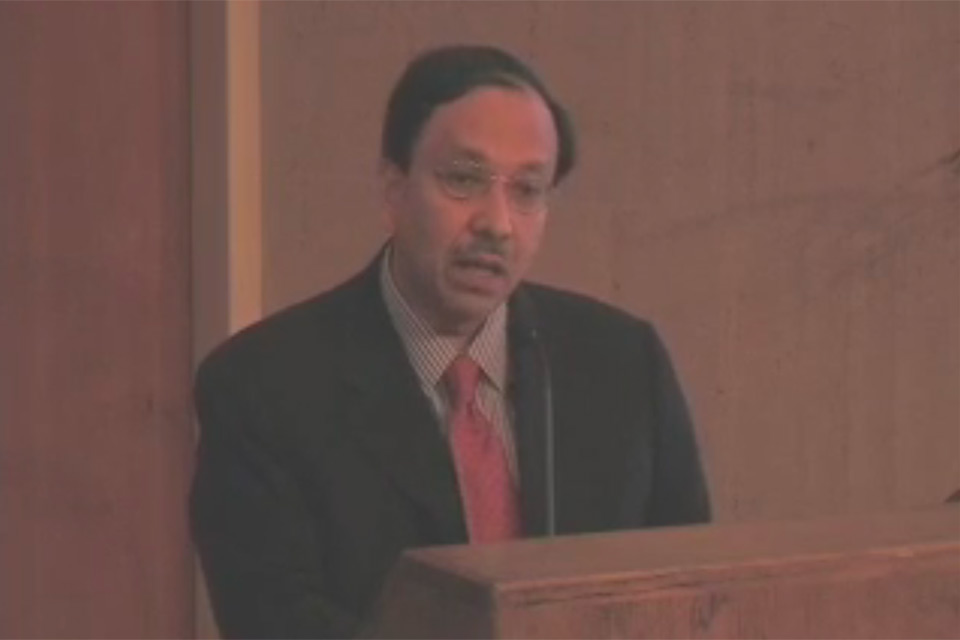Sugata Bose
Fall 2009 Lecture
“Different Universalisms, Colorful Cosmopolitanisms: The Global Imagination of the Colonized”
Featuring Sugata Bose, Gardiner Professor of Oceanic History and Affairs at Harvard University
Monday, November 16, 2009
 The inaugural Soli Sorabjee Lecture was delivered by Professor Sugata Bose at Brandeis University on Nov. 16, 2009. Professor Bose is the Gardiner Professor of Oceanic History and Affairs and the Director of the South Asia Initiative at Harvard University. His talk was titled “Different Universalisms, Colorful Cosmopolitanisms: The Global Imagination of the Colonized.” He is the author of several books on the economic, social and political history of modern South Asia.
The inaugural Soli Sorabjee Lecture was delivered by Professor Sugata Bose at Brandeis University on Nov. 16, 2009. Professor Bose is the Gardiner Professor of Oceanic History and Affairs and the Director of the South Asia Initiative at Harvard University. His talk was titled “Different Universalisms, Colorful Cosmopolitanisms: The Global Imagination of the Colonized.” He is the author of several books on the economic, social and political history of modern South Asia.
The event began with a brief reception with food and drink for those interested in South Asian Studies. Daniel Terris, Vice President for Global Affairs, opened the program with an introduction of the Brandeis-India Initiative, a new university-effort to engage with the sub-continent.
 Aarti Mody ’10 (right), a Brandeis undergraduate and the granddaughter of Soli Sorabjee, gave an eloquent and moving introduction of her grandfather (pdf) and his work on the protection of human rights and justice in India and his contributions in the arena of freedom of speech and expression.
Aarti Mody ’10 (right), a Brandeis undergraduate and the granddaughter of Soli Sorabjee, gave an eloquent and moving introduction of her grandfather (pdf) and his work on the protection of human rights and justice in India and his contributions in the arena of freedom of speech and expression.
Prof. Bose was then introduced by Prof. Govind Sreenivasan, who is an associate professor of history at Brandeis University. A reception followed the lecture, and several faculty and graduate students took Prof. Bose out to dinner for further discussion of his lecture and the work of Mr. Sorabjee.
About the Speaker
Professor Bose’s field of specialization is modern South Asian and Indian Ocean history. He obtained his PhD from the University of Cambridge. His most recent book is A Hundred Horizons: the Indian Ocean in the Age of Global Empire (2006). In it, Bose crosses area studies and disciplinary frontiers and bridges the domains of political economy and culture. He was a recipient of the Guggenheim Fellowship in 1997.
Using the Indian writer Rabindranath Tagore and other intellectuals as guides, Professor Bose tackled the complex issue of “universalism” at the turn of the 20th century, showing how ideas about universalism were conceived outside of the Western mind. Bose suggests that these Indian artists had a different conception of a universal humanity — both reacting to and drawing upon Western thought — that allowed for empathy and nuance while maintaining local and cultural allegiances.
